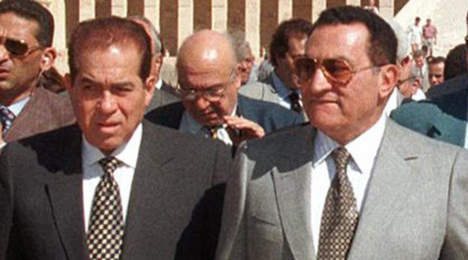
Egypt moved a step closer to forming a new government on December 1, as Prime Minister Kamal Ganzouri submitted his cabinet nominations to the Supreme Council of the Armed Forces (SCAF). Ganzouri is expected to announce the members of his new cabinet on December 3, pending the SCAF’s approval, but all signs suggest that the "new" government will actually be a disappointing reenactment of its predecessor.
After former Prime Minister Essam Sharaf’s embattled cabinet collectively resigned amid escalating anti-government protests last week, the SCAF hastily appointed Ganzouri – who served as Mubarak’s premier in the late 90s – to form the “salvation government” demanded by presidential candidate Mohamed ElBaradei and most major political forces. Although the slate of nominees has not been formally announced, preliminary reports indicate that Ganzouri’s proposed government looks strikingly similar to the outgoing cabinet, retaining ten of Sharaf’s ministers including two holdovers from Mubarak’s government, Minister of International Cooperation Fayza Aboul Naga and Electricity Minister Hassan Younis. Protesters asked for a reshuffle; instead, they are getting a reinstatement of many of the same officials who were forced to step down last week. Perhaps Ganzoury is hoping that Egyptians suffer from epidemic amnesia and won’t notice that the “new” cabinet looks almost exactly like the old one?
One of the few ministers who was not asked to stay on is Finance Minister Hazem al-Beblawi, who will be replaced by Ganzouri himself. In recent months, al-Beblawi has taken a number of pragmatic steps to stabilize Egypt’s economy, including reopening negotiations with the IMF over a previously rejected multi-billion dollar financing package and vowing to abolish certain fuel and food subsidies, a major drain on the national budget. Al-Beblawi’s removal from the cabinet could derail the sensible economic policies he was trying to promote.
Other changes to the cabinet lineup are similarly troubling. Egyptian media speculated that Major General Mohamed Ibrahim was a front-runner for the Interior Ministry post, after he was seen leaving a meeting with Ganzouri on November 30. The appointment of another military officer to head the Interior Ministry would undoubtedly agitate human rights activists and protesters who have demanded that the ministry be radically restructured under civilian leadership. As if his Mubarak-era credentials as Giza’s security director under former Interior Minister Habib al-Adly weren’t bad enough, Ibrahim has also been accused of “massacring” Sudanese refugees. With political parties coalescing around calls for an immediate end to the SCAF’s rule, the inclusion of military officials in the next cabinet would seriously undermine its legitimacy and could invite a resurgence of anti-government protests. Already, pilots have threatened to close Egyptian airspace if Ganzouri chooses a military officer to lead the Ministry of Civil Aviation. In an apparent concession to protesters, Ganzouri hastily promised to appoint a civilian minister of aviation and also agreed to establish a “Ministry for the Revolution’s Injured and Martyred.”
But despite these token gestures, it is clear that Ganzouri’s déjà vu cabinet is a far cry from the “national salvation government” envisioned by protesters in Tahrir Square and backed by most of the major parties and presidential candidates. And the fact that several leading public figures under consideration for ministerial portfolios have declined the posts does not bode well for the Ganzouri government’s legitimacy. Prominent journalists Adel Hammouda and Magdy al-Gallad both declined the Information Ministry post, while actor Mohamed Sobhy rejected an offer to lead the Ministry of Culture. Ganzouri hasn’t even announced the new lineup yet, but his cabinet is already destined to be a disappointment.
Mara Revkin is the assistant director of the Rafik Hariri Center for the Middle East and editor of EgyptSource. She can be reached at mrevkin@acus.org.
Photo Credit: ANP
Image: media_xl_1023800.jpg
